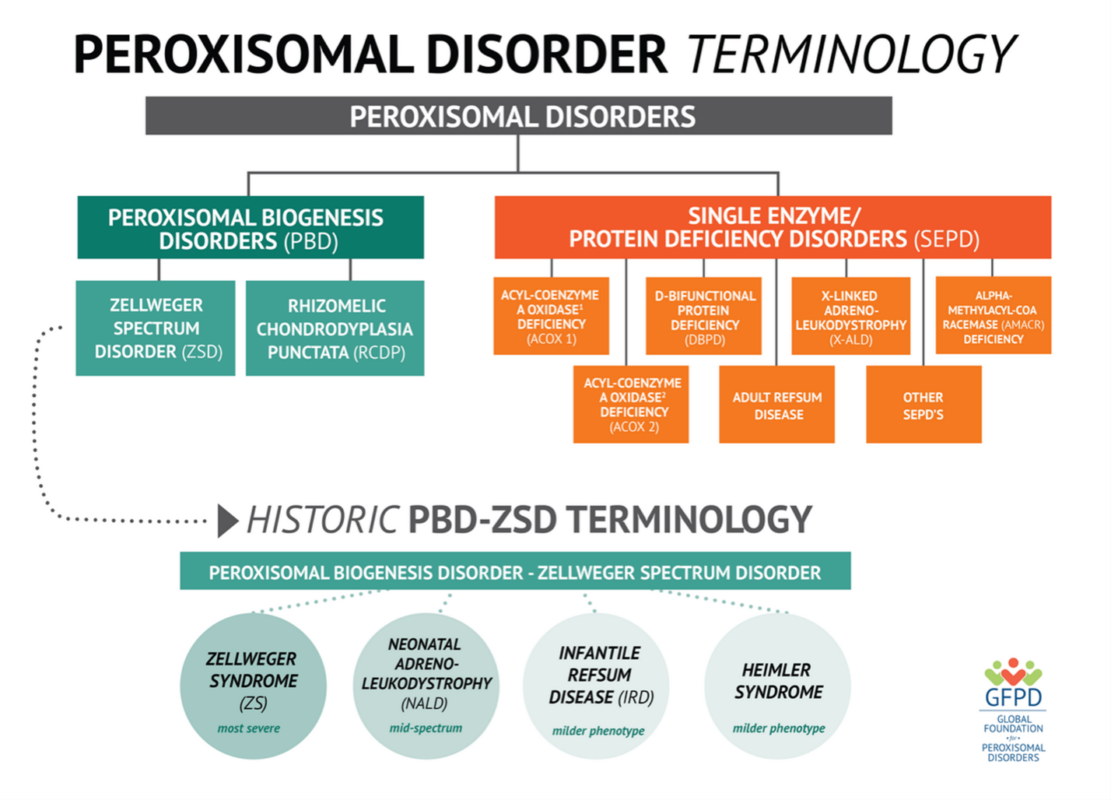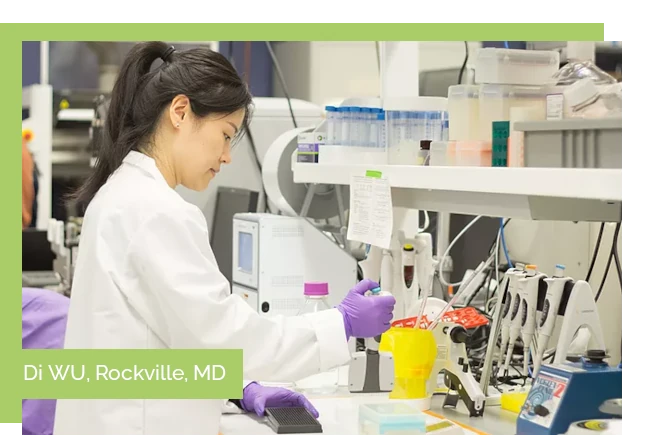Peroxisomal Disorders
Peroxisomal disorders are rare, genetic, terminal conditions that affect all major organ systems of the body.
A peroxisomal disorder on the Zellweger spectrum means that the peroxisomes in your cells aren’t working properly, are absent, or are severely decreased.
Single enzyme protein deficiencies including D-Bifunctional Protein Deficiency (DBPD), Acyl-CoA Oxidase Deficiency (ACOX), Alpha-Methylacyl-CoA Racemase (AMACR) Deficiency, Adult Refsum Disease, and X-Linked Adrenoleukodystrophy (X-ALD) are also peroxisomal disorders.
Peroxisomes are necessary for cell function, normal brain development, and the formation of myelin.


You might hear peroxisome biogenesis disorder-Zellweger spectrum disorder (PBD-ZSD) referred to by other names, including Zellweger syndrome (ZS), neonatal adrenoleukodystrophy (NALD), infantile Refsum disease (IRD), and Heimler syndrome. In recent years these disorders that were formerly grouped into separate diseases, are now known to be on a continuum with varying degrees of disease severity.
As the understanding of this disorder has grown, there has been a movement away from the original disease categories towards a continuum of disease severity for PBD-ZSD, ranging from most severe (Zellweger syndrome), intermediate (neonatal adrenoleukodystrophy), and mild (infantile Refsum disease and Heimler syndrome). Although less common now, you may occasionally hear PBD-ZSD referred to by any of these former names.

The symptoms of peroxisomal disorders vary greatly depending on the inpidual patient.
Some hallmark symptoms of peroxisomal disorders include hearing and vision loss, hypotonia, neurological issues, seizures, developmental delay, feeding issues, adrenal insufficiency, leukodystrophy, and liver, kidney, and bone disease.
Some patients with a peroxisomal disorder will show some form of craniofacial differences such as a high forehead, broad nasal bridge, low set ears, epicanthal folds, or a large fontanel. Early symptoms in newborns may be profound low muscle tone, seizures, apnea, hearing and vision difficulties, and an inability to eat.
A great resources to learn more about symptoms and symptoms prevalence is the 2020 publishing, Zellweger spectrum disorder: A cross-sectional study of symptom prevalence using input from family caregivers – ScienceDirect
Peroxisomal disorders are inherited in an autosomal recessive manner, meaning that both the mother and father of a patient have to carry the recessive gene for the patient to have the disorder. These mutations cause one of two major types of peroxisomal disorders:
Checking the blood for biochemical markers of peroxisomal disorders can reliably be used to diagnose a patient.
Confirmation through additional blood draws to sequence the patient’s DNA and identify mutations is recommended.
Although it is estimated that 1 in 50,000 births are affected by a peroxisomal disorder, actual diagnoses may increase as newborn screening for peroxisomal disorders is introduced across the U.S.

Currently, there are no effective cures for peroxisomal disorders. Instead, management and treatment of symptoms are crucial to help patients with peroxisomal disorders live longer, healthier lives. A team of specialists to help treat symptoms may include a pediatrician, endocrinologist, neurologist, physical therapist, speech therapist, special education teacher, ophthalmologist and audiologist.
There are currently clinical trials in place to better understand these disorders in the hope that future treatments for the many symptoms of peroxisomal disorders become available.
There is a wide range of life expectancy for patients with peroxisomal disorders. Most patients with a severe phenotype, do not live past a year old, but some patients with a milder phenotype may live into adulthood.
The Global Foundation for Peroxisomal Disorders (GFPD) was founded in 2010 by parents of children impacted by Peroxisome Biogenesis Disorder-Zellweger Spectrum Disorder (PBD-ZSD). GFPD is a 501(c)(3) nonprofit public charity committed to funding research to develop a greater understanding of PBD-ZSD and related peroxisomal disorders.
Additionally, the GFPD organizes Family and Scientific Conferences, connects families through online support groups, and also provides an equipment exchange program. Our Scientific Advisory Board includes the foremost researchers and physicians in the field of peroxisomal disorders. In their roles as advisers, members collaborate with each other and with our Board of Directors and staff in order to better guide and support our families and the research initiatives of the GFPD.
